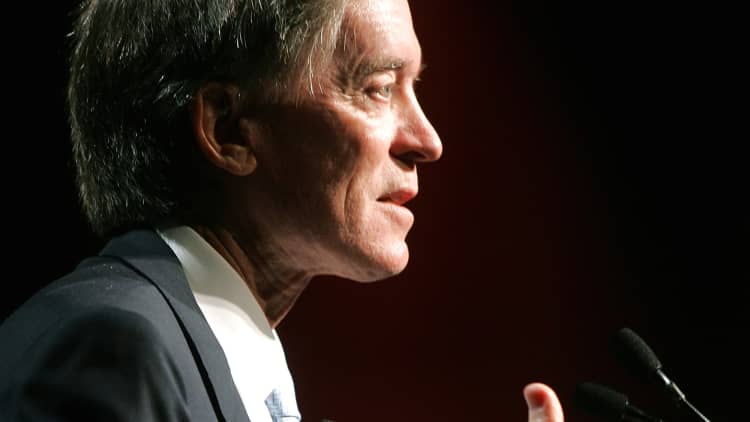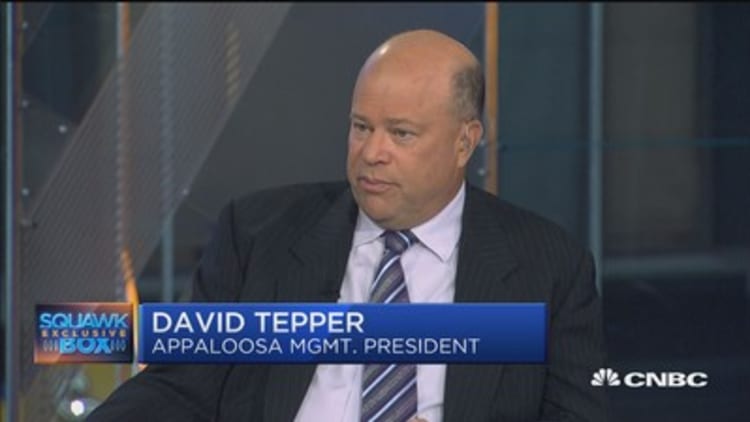
Early in the year, bond guru Bill Gross warned clients that if the 10-year Treasury yield jumped past 2.6 percent, bad things for the fixed income market would follow.
The benchmark government note surpassed that level briefly Thursday afternoon, raising questions about what's next for bonds.
"If 2.6 percent is broken on the upside ... a secular bear bond market has begun," Gross told investors in his monthly letter in January. "Watch the 2.6 percent level. Much more important than Dow 20,000. Much more important than $60-a-barrel oil. Much more important than dollar/euro parity at 1.00. It is the key to interest rate levels and perhaps stock prices in 2017."
Gross told CNBC "I think so" when asked if the 2.6 percent break automatically signaled a bear market.
"I've said, not predicting that it would exceed 2.6 percent but that if it did, it would be the signal of a longer-term secular bear market," he said on "Power Lunch. "For 30 years, interest rates have been coming down, lower highs and lower lows but we're at a point now in terms of a long-term trend line where 2.6 percent represents the point where an interest rate reversal should take place. If it doesn't, if 2.6 is broken and move to 3 percent, then that basically says that interest rates are headed higher on a longer-term basis."
Since his initial warning, Dow 20,000 has been blown past, oil has backed well off its highs, and the dollar and the euro have yet to reach parity. Prior to this week, bond yields had been held more or less in check as the equity rally has continued.
However, this week has been tough for stocks, with the losing around 1 percent.
In the meantime, bond yields have drifted higher and jumped shortly after 2 p.m. ET, finally pushing the 10-year over 2.6 percent for the first time since mid-December. The level was passed only briefly back then and really hasn't held above there since April 2014. The 10-year last traded at 2.597 percent.
Whether this represents a bond bear market is tough to tell, but the signs are building.
Hedge fund heavyweight David Tepper appeared Wednesday on CNBC and, when asked whether he was short bonds, said, "You bet your heinie."

However, he did not seem to share Gross' view that trouble could be right around the corner.
"We've got a lot of room until we have to worry," Tepper said.
Several other fixed income experts also said they do not see anything particularly troubling about the yield rising above 2.6 percent. After all, Federal Reserve officials have given a clear indication that a quarter-point hike — or 25 basis points — is on the way next week.
Investors also haven't been shaken by a rise in yields. They've poured $75.3 billion into bond funds in 2017 alone, according to Bank of America Merrill Lynch.
"I don't think it tips us into a bond recession," said Jay Schechter, partner and senior advisor at Singer Xenos Wealth Management. "I just think it's a normal process based on where yields have been and have been and where they're going."
Schechter said he is more likely to follow the guidance of DoubleLine's Jeffrey Gundlach "more than we would Bill Gross." Gundlach has said he expects the 10-year yield ultimately will drift below 2.25 percent before rising again perhaps to 3 percent before the end of the year. He expects much higher yields in subsequent years.
Yields and prices move in opposite directions, so moves higher in yield eats into capital.
"People who are buying long bonds ... there's going to be pain for people who are expecting that rates are going to stay somewhat stable there," Schechter said. "Interest rates have been much higher historically than where they are now. We've been in a 10-year period of unusually low interest rates."
That's why Schechter said he's keeping clients in shorter-duration fixed income, which he thinks will provide a better buffer against rising rates on the long end of the yield curve.
Robert Tipp, chief investment strategist at Prudential Fixed Income, thinks yields are heading lower and also does not buy the bear market theory.
"There's a lot of uncertainty and the market is pricing in some risk premium into the Treasury market in the form of higher yields," he said. "This will turn out to be more of an opportunity."


